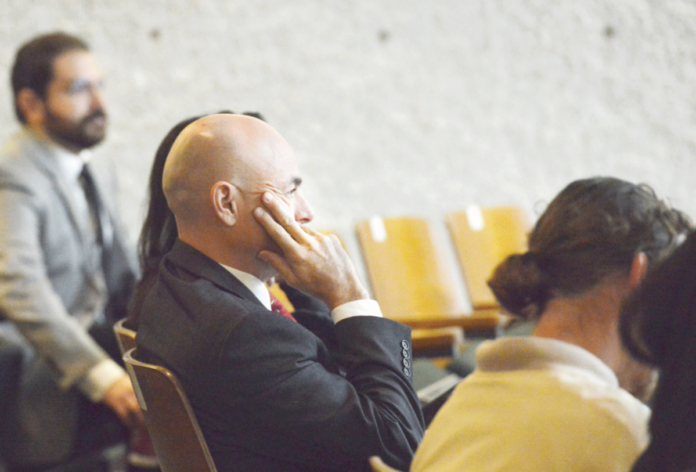BROWNSVILLE — Embattled former fire chief Carlos Elizondo has filed a motion seeking to recuse 404th state District Judge Elia Cornejo-Lopez from hearing a challenge to the search warrants she signed that resulted in his arrest.
The March 9 filing came two days after 107th state District Judge Benjamin Euresti Jr. ruled that Elizondo is not eligible for the proceeding because he’s already been indicted.
A grand jury indicted Elizondo last October on accusations that he stole $8,000 from the Brownsville Firefighters Association Political Action Committee through unauthorized ATM withdrawals, according to a police report filed by the association’s president, Jorge Lerma.
Elizondo has pleaded not guilty, and a trial is scheduled for April.
During the March 7 hearing in front of Euresti, Assistant District Attorney Art Teniente said the proper request for any challenge to the search warrant would be in Cornejo-Lopez’s courtroom.
In Elizondo’s motion to recuse Cornejo-Lopez, the former fire chief’s attorney, Eddie Lucio, said the fact that Cornejo-Lopez filed a federal civil lawsuit against the Brownsville Independent School District over how administrators and trustees have handled grievances she has with the district necessitated the motion to recuse.
“It is Mr. Elizondo’s constitutional right to challenge the search warrant signed by Judge Cornejo Lopez,” the motion states. “However, as Applicant is a BISD trustee, his actions as a trustee are a subject of the judge’s pending federal civil suit while she presides over his request.”
Elizondo is a BISD trustee and has had unfavorable encounters with Cornejo-Lopez while in that role, according to the motion, which cites two September board meetings where Cornejo-Lopez appeared before the BISD Board of Trustees, including Elizondo, and was not able to address the board concerning her grievances, which the judge has outlined in her lawsuit against BISD.
“Furthermore, the fact that Defendant had personally opposed the Judge’s request to his Board was made public a month before Judge Cornejo Lopez signed his arrest and search warrants,” the motion states.
Elizondo is referencing the Sept. 14, 2017, leaked recording of Brownsville City Commissioner Cesar De Leon, who made national headlines when a secretly taped conversation between him and Elizondo showed the city commissioner using racial slurs to describe two African American assistant district attorneys who work for Cameron County District Attorney Luis V. Saenz, according to the motion.
“They are (F-word) … and I would say this, that I would never dare use that word, but you know what, yes, there are a couple of (N-word) in there that think all of us are (F-word) taco eaters,” De Leon can be heard saying in the tape.
De Leon then resigned, for a short time, and reversed course.
While the racial slurs De Leon used grabbed headlines, the more than four-hour recording also shows that a third-party politician, De Leon, placed pressure on Elizondo to “fix” Cornejo-Lopez’s problem concerning her children and BISD, according to the motion.
At the time, De Leon apologized and told The Brownsville Herald that he believes Elizondo edited and released the audio because he wanted former City Manager Charlie Cabler to stop an investigation into the fire department’s usage of an ambulance service that wasn’t permitted.
On Sept. 7, 2017, Elizondo was demoted to lieutenant two days after Brownsville Police Department Chief Orlando Rodriguez sent a letter to City Commissioners Ben R. Neece, Jessica Tetreau-Kalifa and Joel Munguia, who make up the City of Brownsville’s Audit & Oversight Committee.
By Oct. 10, 2017, Cabler announced his retirement in a letter to Mayor Tony Martinez and City Commissioners, citing challenges to questions surrounding the city’s policies and procedures, along with his need to take care of his mother, who is suffering from cancer.
“As a result, I am deeply concerned that my continued presence will serve to further distract our noble commission from securing a full and transparent audit into the issue,” Cabler said, though the former city manager does not elaborate on what issue he is referencing in his resignation letter.
Seven days later, on Oct. 17, 2017, Elizondo was arrested and his home searched based off to warrants signed by Cornejo-Lopez, who, on Nov. 30, 2017, sued BISD over accusations of administrators and trustees mistreating her children and retaliating against them after she filed her grievance against the district.
Elizondo’s motion also accused the Cameron County District Attorney’s Office of twisting itself into a legal pretzel because in August 2016, Cornejo-Lopez ruled that post-indictment hearings, like a challenge to a search warrant, must be heard in the court where the indictment is pending.
That hearing concerned a search warrant conducted at 5596 Mystic Bend.
According to Elizondo, Cornejo-Lopez’s ruling contradicts that of Euresti’s ruling.
“As a result of the State’s change in position, Mr. Elizondo now moves to recuse 404th District Judge Elia Cornejo Lopez,” the motion states.
The challenge to the search warrant was filed separately in Cornejo-Lopez’s court, but Elizondo also filed a similar challenge to the warrants in his criminal case, on which Euresti ruled March 7.
The motion to recuse has been filed in Cornejo-Lopez’s court, not in the criminal case being heard by Euresti, court records indicate.
As far as the criminal case goes, Elizondo is scheduled to appear before Euresti today regarding a writ of habeas corpus Lucio filed that argues the Cameron County District Attorney’s Office is charging him multiple times over one accusation.
ADA Teniente filed a response to that motion March 15, arguing that the writ of habeas corpus is defective because it lacked certain language required by law.
Last Friday, Lucio responded by updating legal jargon in the writ “for the sake of expediency and in hopes the State will now respond.”
Teniente, in his March 15 response, asked Euresti to reschedule the hearing if Lucio cures the defect in the writ, though Lucio disputes that the writ was defective in any way, court records show.




